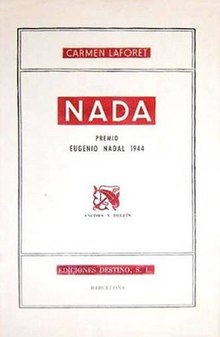Nada (novel)

Nada, which means "nothing" in Spanish, is the first novel of Spanish author Carmen Laforet, published in 1945.
Plot[edit]
The novel is set in post Spanish Civil War Barcelona. The novel is narrated by its main character, Andrea, an orphan, who has fond memories of her well off family in Barcelona, and has been raised in a convent in provincial Spain.
The government has awarded Andrea a scholarship and a subsistence stipend so that she can attend university. She travels to Barcelona to the home of her grandmother, only to find it filthy and falling apart. Her frail, devoutly Catholic grandmother seems unaware of her miserable surroundings. Also living in the crumbling house is a strict, controlling aunt Angustias, a roguish, but musically talented uncle, Roman, another uncle, Juan, who abuses his beautiful wife Gloria. The whole group regularly comes to blows throughout Andrea’s stay, and Angustias eventually escapes by entering a convent.
At the university, Andrea befriends a rich girl, Ena, who begins a strange relationship with Andrea's Uncle Roman. She pretends to care for him, but is really taking revenge for his poor treatment of her mother years before.
Roman becomes involved in the black market, but Gloria reports him to the authorities. He commits suicide, in fear of arrest by the Francoist police.
Ena and her family move to Madrid, and soon send for Andrea to join them.[1] Ena’s father offers to give her a job and subsidize her further education. In the final part of the novel, Andrea is picked up by the family’s fancy car and she leaves behind her unpleasant life on Aribau Street in Barcelona.[2]
Reception[edit]
Nada was published in 1945 when LaForet was 23 and created a "sensation" in Barcelona when it came out.[3][4] Nada won Laforet the first Premio Nadal literary prize in Spain.[5][6]
This book passed the censorship of the Francoist State and so it avoids directly addressing the harshness of the government at the time. However, the book became very popular when it finally cleared Franco’s censors.[7] It is considered to be an important contribution to the school of Existentialist literature of post-Civil War Spain.[8][9]
In 2007 an English translation of Nada by Edith Grossman was published.[10]
Fernández-Lamarque and Fernández-Babineaux see metatextual references with Little Red Riding Hood and gender inversion in the novel depicting Andrea and Ena as androgynous beings.[11]
References[edit]
- ^ Marsha S. Collins, Journal Symposium, Carmen Laforet's Nada: Fictional Form and the Search for Identity, Vol. 38, 1984.
- ^ Virginia Higgenbottham,"Nada and the Cinderella Syndrome,"' Rendezvous: Journal of Arts and Letters 22.2 (1986).
- ^ Eberstadt, Fernanda (13 April 2007). "Carmen LaForet's 'Nada': A young woman's take on a sordid world". The New York Times.
- ^ Nada, by Carmen Laforet (trans. Edith Grossman) - Reviews - Books - The Independent
- ^ Obituary: Carmen Laforet | World news | The Guardian
- ^ Nada by Carmen Laforet: book review | Bookmarks Magazine
- ^ Fernanda Eberstadt, New York Times Book Review, April 15, 2007, p.3.
- ^ Carmen Laforet (Author of Nada)
- ^ Nada – Carmen Laforet – Google Boeken
- ^ Manguel, Alberto. "Alberto Manguel hails the first appearance in English of the modern Spanish classic Nada, by Carmen Laforet". Review of Nada, by Carmen Laforet | Books | The Guardian
- ^ Mariel Reinoso Ingliso (2 December 2015). REVISTA DESTIEMPOS N48: Revista de divulgación académica y cultural. Editorial Grupo destiempos. pp. 36–. GGKEY:5U7ZD9HGUTR.
